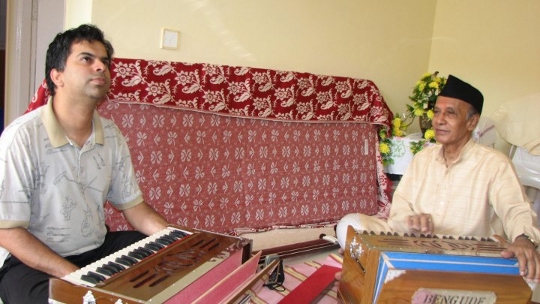Can you play Sa Re Ga Ma, my child?
This article has been published in Raag Rang Newsletter (raagrang.org) on 3rd October 2011.
This November, my guruji, Pt. Tulsidas Borkar turns 76. This gives me pause to reflect on his contributions to Hindustani Classical Music and on the love and blessings he has showered on me for the last 30 years that he has been a part of my life.
Pandit Tulsidas Borkar playing Raag Yaman. Tabla accompaniment by Shri Kedar Vaishampayan.
Panditji is one of the greatest harmonium players and teachers of the India, and his contributions span many dimensions: Inspired by his guru P. Madhukar as well as by the great vocalists of India that he spent many years with, his performance technique is mind blowing and yet very emotional. He has a unique and versatile accompaniment style, has created many beautiful compositions that are difficult but attractive and touching, has taught dozens of students both performance and tuning techniques, has created several leading artists of the next generation and he has also made several constructional changes to the harmonium. It will take volumes to fully describe and convey the immense value of all his work.
100 years ago, the harmonium was a very new instrument in Indian music. Today, it is inseparable from a Hindustani Classical concert. Harmonium artists of today are much more respected than they were 50 years ago. Harmonium accompaniment is enjoyed and embraced by audiences and artists alike. The fan base for solo harmonium recitals is growing globally. While this instrument still has a long way to go in achieving the popularity levels of instruments like the Sitar or Santoor, the transformation that has happened over the last 50 years is very palpable — and much of it is due to the contributions of Pt. Tulsidas Borkar.
It is only because of him, that I have had the opportunity to work with some of the greatest vocalists of India and to perform as a soloist at prestigious venues throughout the world. I will forever be indebted to him for the gift of music that he has bestowed upon me.
Even today, I remember my first lesson from him. This is in 1981, when I was in 4th grade, at my house in Mumbai. I had already had a couple of years of harmonium training from my grandfather and my previous guru, Shri Arvind Gajendragadkar. Everybody used to say how well I play, so I was very confident that I could easily impress this new Guruji!
He asked me "Can you play Sa Re Ga Ma, my child? ... in single, double and quadruple speeds?" I should confess, I was actually a little annoyed and insulted by this question. Here I was, the most talented kid in the neighborhood, and this new Guruji asks me, if I can play Sa Re Ga Ma!! So I immediately launched into it, eager to show him how well I could play the harmonium. He listened to me calmly and nicely, and said — "That was good. But you will not be able to comfortably play in quadruple speed if you start at this speed, so you may want to slow down a bit first... " and it was at that time that I first realized... perhaps I do not really know everything there is to know about music and the harmonium! Very gently he had opened my eyes to the thought, that even If I think I know a lot, perhaps there is something else, something more, beyond what I know. There is a Sanskrit couplet:


Translated — I bow down to my guru — the guru who uses knowledge to gently open the eyes of the student blinded by ignorance; much like applying Kaajal (eye liner).
And this one thought, "that there is still something more to learn" is what I have continued to experience throughout my last 30 years of learning from him. Every time I spend time with him, he shows me the next step, the next improvement, the next musical idea.
Today, when I go to India and learn from him, and he still asks me, "Can you play Sa Re Ga Ma, my child?" and now I know the answer — I say, "I will try Guruji, but please tell me where I am making a mistake and how I can improve"
Can you play Sa Re Ga Ma, my child?
Related Videos
Panditji's youngest disciple Unmesh Khaire
The third generation: Rohan Prabhudesai (disciple of Shri Kedar Naphade)